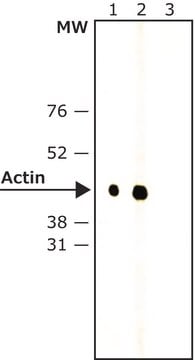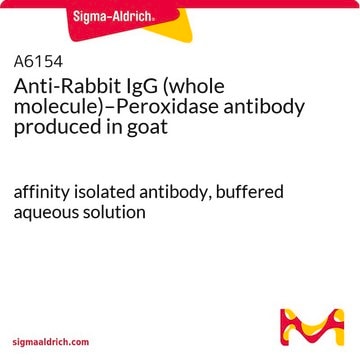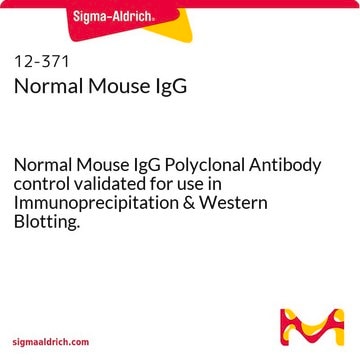B5283
Anti-Rabbit IgG (γ-chain specific)−Biotin antibody, Mouse monoclonal
clone RG-96, purified from hybridoma cell culture
Sinónimos:
Monoclonal Anti-Rabbit IgG (γ-chain specific)
Seleccione un Tamaño
Seleccione un Tamaño
About This Item
Productos recomendados
origen biológico
mouse
Nivel de calidad
conjugado
biotin conjugate
forma del anticuerpo
purified immunoglobulin
tipo de anticuerpo
secondary antibodies
clon
RG-96, monoclonal
Formulario
buffered aqueous solution
reactividad de especies
rabbit
no debe reaccionar con
goat, feline, pig, guinea pig, rat, bovine, canine, human, horse, sheep, chicken
técnicas
direct ELISA: 1:150,000
immunohistochemistry (formalin-fixed, paraffin-embedded sections): 1:1,000
western blot (chemiluminescent): 1:200,000-1:400,000
isotipo
IgG1
Condiciones de envío
dry ice
temp. de almacenamiento
−20°C
modificación del objetivo postraduccional
unmodified
¿Está buscando productos similares? Visita Guía de comparación de productos
Descripción general
Aplicación
Anti-Rabbit IgG (γ-chain specific)-Biotin antibody, Mouse monoclonal has been used in β-Catenin enzyme immunoassay. It has also been used in immunohistochemistry for examining histology of mammary glands.
Acciones bioquímicas o fisiológicas
Forma física
Cláusula de descargo de responsabilidad
¿No encuentra el producto adecuado?
Pruebe nuestro Herramienta de selección de productos.
Código de clase de almacenamiento
10 - Combustible liquids
Clase de riesgo para el agua (WGK)
nwg
Punto de inflamabilidad (°F)
Not applicable
Punto de inflamabilidad (°C)
Not applicable
Elija entre una de las versiones más recientes:
Certificados de análisis (COA)
¿No ve la versión correcta?
Si necesita una versión concreta, puede buscar un certificado específico por el número de lote.
¿Ya tiene este producto?
Encuentre la documentación para los productos que ha comprado recientemente en la Biblioteca de documentos.
Active Filters
Nuestro equipo de científicos tiene experiencia en todas las áreas de investigación: Ciencias de la vida, Ciencia de los materiales, Síntesis química, Cromatografía, Analítica y muchas otras.
Póngase en contacto con el Servicio técnico








